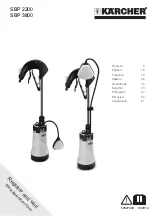
81883X
Page 2 of 12
OPERATING AND SAFETY PRECAUTIONS
READ, UNDERSTAND, AND FOLLOW THIS INFORMATION TO AVOID INJURY AND PROPERTY DAMAGE.
EXCESSIVE AIR PRESSURE
STATIC SPARK
HAZARDOUS MATERIALS
HAZARDOUS PRESSURE
WARNING
EXCESSIVE AIR PRESSURE. Can cause personĆ
al injury, pump damage or property damage.
S
Do not exceed the maximum inlet air pressure as stated on the
pump model plate.
S
Be sure material hoses and other components are able to withĆ
stand fluid pressures developed by this pump. Check all hoses
for damage or wear. Be certain dispensing device is clean and
in proper working condition.
WARNING
STATIC SPARK. Can cause explosion resulting in
severe injury or death. Ground pump and pumping system.
S
Sparks can ignite flammable material and vapors.
S
The pumping system and object being sprayed must be
grounded when it is pumping, flushing, recirculating or sprayĆ
ing flammable materials such as paints, solvents, lacquers,
etc. or used in a location where surrounding atmosphere is
conducive to spontaneous combustion. Ground the dispensĆ
ing valve or device, containers, hoses and any object to which
material is being pumped.
S
818831 Groundable Acetal pumps: Use the pump grounding
screw provided. Connect a 12 ga. (min.) wire (kit is included) to
a good earth ground source.
S
Secure pump, connections and all contact points to avoid
vibration and generation of contact or static spark.
S
Consult local building codes and electrical codes for specific
grounding requirements.
S
After grounding, periodically verify continuity of electrical path
to ground. Test with an ohmmeter from each component (e.g.,
hoses, pump, clamps, container, spray gun, etc.) to ground to
insure continuity. Ohmmeter should show 0.1 ohms or less.
S
Submerse the outlet hose end, dispensing valve or device in
the material being dispensed if possible. (Avoid free streaming
of material being dispensed.)
S
Use hoses incorporating a static wire.
S
Use proper ventilation.
S
Keep inflammables away from heat, open flames and sparks.
S
Keep containers closed when not in use.
WARNING
Pump exhaust may contain contaminants. Can
cause severe injury. Pipe exhaust away from work area and perĆ
sonnel.
S
In the event of a diaphragm rupture, material can be forced out
of the air exhaust muffler.
S
Pipe the exhaust to a safe remote location when pumping hazĆ
ardous or inflammable materials.
S
Use a grounded 3/8" minimum i.d. hose between the pump and
the muffler.
WARNING
HAZARDOUS PRESSURE. Can result in serious
injury or property damage. Do not service or clean pump,
hoses or dispensing valve while the system is pressurized.
S
Disconnect air supply line and relieve pressure from the sysĆ
tem by opening dispensing valve or device and / or carefully
and slowly loosening and removing outlet hose or piping from
pump.
WARNING
HAZARDOUS MATERIALS. Can cause serious inĆ
jury or property damage. Do not attempt to return a pump to the
factory or service center that contains hazardous material.
Safe handling practices must comply with local and national
laws and safety code requirements.
S
Obtain Material Safety Data Sheets on all materials from the
supplier for proper handling instructions.
CAUTION
Verify the chemical compatibility of the pump
wetted parts and the substance being pumped, flushed or reĆ
circulated. Chemical compatibility may change with temperaĆ
ture and concentration of the chemical(s) within the
substances being pumped, flushed or circulated. Consult
Bink's representative for information on chemical compatibiliĆ
ty.
CAUTION
Maximum temperatures are based on mechaniĆ
cal stress only. Certain chemicals will significantly reduce
maximum safe operating temperature. Consult Bink's repreĆ
sentative for information on chemical compatibility. Refer to
PUMP DATA on page 1 of this manual.
CAUTION
Be certain all operators of this equipment have
been trained for safe working practices, understand it's limitaĆ
tions, and wear safety goggles / equipment when required.
CAUTION
Do not use the pump for the structural support of
the piping system. Be certain the system components are
properly supported to prevent stress on the pump parts.
S
Suction and discharge connections should be flexible connecĆ
tions (such as hose), not rigid piped, and should be compatible
with the substance being pumped.
CAUTION
Prevent unnecessary damage to the pump. Do
not allow pump to operate when out of material for long periods
of time.
S
Disconnect air line from pump when system sits idle for long
periods of time.
CAUTION
Use only genuine Bink's replacement parts to asĆ
sure compatible pressure rating and longest service life.
NOTICE
Install the pump in the vertical position. The
pump may not prime properly if the balls do not check by gravĆ
ity upon startĆup.
NOTICE
ReĆtorque all fasteners before operation. Creep
of housing and gasket materials may cause fasteners to loosĆ
en. ReĆtorque all fasteners to insure against fluid or air leakage.
WARNING
CAUTION
NOTICE
= Hazards or unsafe practices which could
result in severe personal injury, death or
substantial property damage.
= Hazards or unsafe practices which could
result in minor personal injury, product
or property damage.
= Important installation, operation or
maintenance information.
Summary of Contents for 818830
Page 12: ...PN 876012 81883X Page 12 of 12...






























